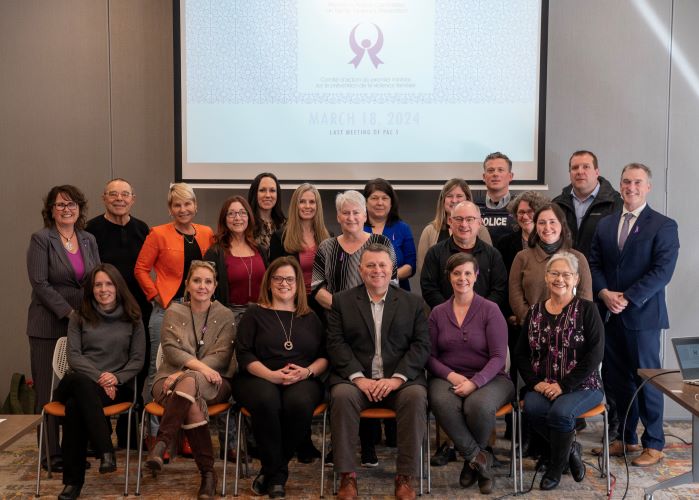Premier's Action Committee on Family Violence Prevention
The Premier's Action Committee on Family Violence Prevention was established in December 1995. It's current mandate is:
The Premier’s Action Committee on Family Violence Prevention’s mandate is to enhance the coordination and impact of
collective efforts in family violence prevention. Its primary role includes, offering support to various initiatives, and nurturing
a culture of information sharing, education, and collaboration in this vital area.
Our Vision Statement
A society where all individuals are safe, respected and valued; where any form of violence is unacceptable; and where children, women and men have opportunities to reach their full potential and contribute to the overall well-being of families and communities.
Our Guiding Principles
Any form of violence in relationships is not acceptable. All people and families are valued. Everyone is entitled to a safe and
secure environment, personal wellbeing, dignity, and respect.
Everyone, including victims, survivors, witnesses, and offenders, is entitled to accessible and appropriate high-quality service and
information which is consistent and respectful.
All persons are equal regardless of race, religion, creed, colour, age, sex, gender identity or expression, marital status, sexual orientation, physical or mental ability, and ethnic or national origin. Preventing and responding to family violence is a shared responsibility.
The knowledge of survivors is important in the design and delivery of services.
Family Violence Statement
Family violence affects, or will affect, all people in Prince Edward Island. Family violence is connected to abuse of power and control, and to injustice based on sex, race, age, class, sexual orientation, and physical or mental ability. Individual history, family history, and current circumstances play a role in family violence.
Family violence is known by many names: child maltreatment, child abuse, incest, child exposure to domestic violence, intimate partner violence, spousal violence, woman abuse, domestic violence, sibling abuse, parent abuse, elder abuse, and abuse of older adults.
Family violence can affect anyone, from any demographic: cultural, national and ethnic origin, socio-economic status, education, gender, age and physical or mental ability.
Family violence can take many forms: harassment, verbal abuse, threats, financial abuse, psychological abuse, emotional abuse, spiritual abuse, neglect, damage to property, injury to pets, physical abuse, sexual abuse, and homicide.
Family violence can happen between: current and former intimate partners (married and unmarried couples, including same-sex couples, and dating partners); a legal guardian or parent and child; blood, marriage or adoptive relatives; and a live-in caregiver and care recipient.
Family violence hurts. It can cause physical and psychological harm. Family violence violates the victim's rights and freedoms. Family violence harms the healthy development of children and youth.
Family violence is a public health issue, a criminal justice issue, and a human rights issue. To address family violence, all of us in Prince Edward Island must work together and share our resources.
Our Strategy

The Premier's Action Committee on Family Violence Prevention supports Family Violence Prevention Week that is organized each year in May.
Committee Membership
Committee membership consists of community and government representatives to ensure diversity and collective responsibility. The following members have been appointed to serve five year terms beginning in 2024:
- Chair, Member-at- large - Danya O'Malley
- AccessAbility Supports, Social Development and Housing - Vacant
- Actions Femmes I.-P.-E. - Vacant
- Adult Protection, Health PEI - Melissa MacAusland
- Community Legal Information - Sarah Dennis
- Community Mental Health and Addictions, Health PEI - Lorna Hutt
- Crown Attorneys' Office, Justice and Public Safety - Jeff MacDonald
- Interministerial Women's Secretariat - Michelle Harris-Genge
- Social Development and Housing - Vacant
- Early Childhood Development, Education and Lifelong Learning - Ann Hayes-MacKenzie
- K to 12, Education and Lifelong Learning - Andrea Garland
- East Prince Women's Information Centre - Andy Lou Somers
- Labour & Industrial Relations / OHS, Economic Growth, Tourism and Culture - Patricia McPhail
- PEERS Alliance - Jody Perry
- PEI Aboriginal Women's Association of PEI - Matilda Ramjattan
- PEI Immigration and Refugee Services Association - Aynur Darian
- PEI Advisory Council on the Status of Women - Jane Ledwell
- PEI Federation of Municipalities - Alana Jankov
- PEI Seniors' Secretariat - Peter Holman
- PEI Chiefs of Police Association - Chief Lewie Sutherland
- PEI Family Violence Prevention Services - Gloria Dennis
- PEI Rape and Sexual Assault Centre - Kelly Peck
- Primary Care, Health PEI - Bruce Davidson
- Public Health, Health PEI - Stephanie Gordon
- Royal Canadian Mounted Police - Brent MacDonald
- Turning Point, Justice and Public Safety - Chelsey Condon
- Victim Services, Justice and Public Safety - Jayelee Grady
- Women's Institute of PEI - Christine Zareck
Resource Staff
- Committee Resource Person - Jennifer Cairns-Burke, Provincial Manager Family Violence Prevention and Community Development
